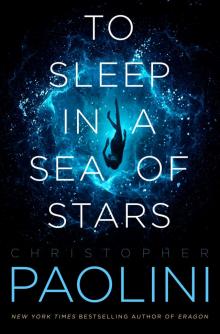- Home
- Christopher Paolini
To Sleep in a Sea of Stars Page 19
To Sleep in a Sea of Stars Read online
Page 19
“But implants already use organic circuits,” said Kira.
Jorrus shook his head. “That is not what I mean. If the suit were organic, if it were living, there would always be a risk of cross-contamination.”
Veera said, “Cells from the suit might take root in the user’s body and grow where they shouldn’t. It would be worse than any natural form of cancer.”
“And likewise,” said Jorrus, “cells from the user might end up disrupting the function of the suit. In order to avoid that outcome, and to avoid the user’s immune system attacking the suit wherever the integration points were placed—”
“—the suit would need to be engineered from the DNA of the user. That would limit each suit to just one user. Another impracticality.”
Kira said, “So then the Jellies—”
“Are not using bio-suits as we understand them,” Veera replied. “Not unless their science is far more advanced than it seems.”
“I see,” said Kira. “And you don’t know anything about the Jellies’ language, aside from what’s already published?”
Veera answered: “Unfortunately—”
“—not,” said Jorrus. “Our apologies; much remains a mystery about the aliens.”
Kira frowned. Again the drone of numbers filled her ears, loud and distracting. She made a face. “What are they doing? Do you know?”
Jorrus snorted. “Annoying the rest of us, that’s what. We—”
“—asked them to turn down the volume, but this is as soft as they will make it. If they don’t prove to be—”
“—cooperative in the future, we may have to speak with them more sternly.”
“Yes,” said Kira, “but who are they?”
“They are Numenists,” Veera and Jorrus said together.
“Numenists?”
“It is a religious order that started on Mars during the early decades of settlement. They worship numbers.”
“Numbers.”
The Entropists nodded, a quick, mirrored jerk of their heads. “Numbers.”
“Why?”
Veera smiled. “Why worship anything? Because they believe it contains deep truths about life, the universe, and everything. More specifically—”
Jorrus smiled. “—they believe in counting. They believe that if they count long enough, they can count every whole number and, perhaps, at the very end of time itself, speak the ultimate number itself.”
“That’s impossible.”
“It doesn’t matter. It’s an item of faith. The man you hear speaking is the Arch Arithmetist, also known as the Pontifex Digitalis, which is—”
“—shockingly bad Latin. The Foxglove Pope as—”
“—many call him. He—”
“—along with assistants from the College of Enumerators—they’re fond of their titles—recites each new number, without break or interruption.” Veera pointed with one crooked finger toward the Numenists. “They consider listening to the enumeration an—”
“—important part of their religious practice. Plus—plus!—”
“—they believe some numbers are more significant than others. Ones that contain certain sequences of digits, primes, and so forth.”
Kira frowned. “That seems pretty strange.”
Veera shrugged. “Maybe. But it gives them comfort, which is more than can be said about most things.”
Then Jorrus leaned toward Kira. “Do you know how they define god?”
Kira shook her head.
“As the greater part of two equal halves.” The Entropists rocked back on their heels, chuckling. “Isn’t that delightful?”
“But … That doesn’t make any sense.”
Veera and Jorrus shrugged. “Faith often doesn’t. Now—”
“—were there any other questions we might help you with?”
Kira laughed ruefully. “Not unless you happen to know the meaning of life.” The moment the words left her mouth, Kira knew they were a mistake, that the Entropists would take her seriously.
And they did. Jorrus said, “The meaning of life—”
“—differs from person to person,” said Veera. “For us it is simple. It is the pursuit of understanding, that we—”
“—may find a way to contravene the heat death of the universe. For you—”
“—we cannot say.”
“I was afraid of that,” Kira said. Then, because she couldn’t help herself: “You take as fact a lot of things others would dispute. The heat death of the universe, for example.”
Together they spoke: “If we are wrong, we are wrong, but our quest is a worthy one. Even if our belief is misplaced—”
“—our success would benefit all,” said Jorrus.
Kira inclined her head. “Fair enough. I didn’t mean to offend.”
Mollified, the two tugged on the cuffs of their robes. Jorrus said, “Perhaps we can help you, Prisoner. Meaning comes from purpose—”
“—and purpose comes in many forms.” Veera steepled her fingers. Surprisingly, Jorrus did not. She said, “Have you ever considered the fact that everything we are originates from the remnants of stars that once exploded?”
Jorrus said, “Vita ex pulvis.”
“We are made from the dust of dead stars.”
“I’m aware of the fact,” said Kira. “It’s a lovely thought, but I don’t see the relevance.”
Jorrus said, “The relevance—”
“—is in the logical extension of that idea.” Veera paused for a moment. “We are aware. We are conscious. And we are made from the same stuff as the heavens.”
“Don’t you see, Prisoner?” said Jorrus. “We are the mind of the universe itself. We and the Jellies and all self-aware beings. We are the universe watching itself, watching and learning.”
“And someday,” said Veera, “we, and by extension the universe, will learn to expand beyond this realm and save ourselves from otherwise inevitable extinction.”
Kira said, “By escaping the heat death of this space.”
Jorrus nodded. “Even so. But the point is not that. The point is that this act of observation and learning is a process we all share—”
“—whether or not we realize it. As such, it gives purpose to everything we do, no matter—”
“—how insignificant it may seem, and from that purpose, meaning. For the universe itself, given consciousness through your own mind—”
“—is aware of your every hurt and care.” Veera smiled. “Take comfort, then, that whatever you choose in life has importance beyond yourself. Importance, even, on a cosmic scale.”
“That seems a little self-aggrandizing,” Kira said.
“Perhaps,” Jorrus replied. “But—”
“—it may also be true,” said Veera.
Kira looked down at her hands. Her problems hadn’t changed, but somehow they felt more manageable now. The idea that she was part of the universe’s consciousness was comforting, albeit in a rather abstract way. No matter what she did moving forward—and no matter what happened to her, even if that meant getting stuck in UMC quarantine again—she would still be part of a cause far larger than herself. And that was a truth no one could ever take from her.
“Thank you,” she said, heartfelt.
The Entropists dipped their heads and touched the tips of their fingers to their foreheads. “You are most welcome, Prisoner. May your path always lead to knowledge.”
“Knowledge to freedom,” she said, completing the refrain. Their definition of freedom differed from hers, but she could appreciate the sentiment.
Then Kira returned to her spot among the crates, called up her overlays, and dove back into the news with a renewed sense of resolve.
4.
Ship-night arrived, and the lights in the hold dimmed to a faint red glow. Kira found it difficult to sleep; her mind was restless, and her body too after so long spent on the Valkyrie. Plus, welcome as it was, it was still strange to have a sense of weight again. Her cheek and hip hurt where
they pressed against the deck.
She thought of Tschetter, and then everyone from the survey team. Hopefully the UMC had thawed out the survivors. It wasn’t good to spend too long in cryo; basic biological processes like digestion and hormone production started to go awry after a certain point. And Jenan always had been prone to cryo sickness.…
In the end, Kira did sleep, but her mind was troubled, and her dreams were more vivid than normal. She saw herself at home, as a child—old memories that she hadn’t recalled in years but that seemed fresh and current, as if time were looping in on itself. She was chasing her sister, Isthah, through the rows of plants in the west greenhouse. Isthah shrieked and waved her hands as she ran, her brown ponytail bouncing against the back of her neck.… Their father cooking arrosito ahumado, the dish his family had brought from San Amaro when they emigrated from Earth and the whole reason there was a firepit in the backyard. Ashes for the sugar, sugar for the rice. Her favorite food because it held a flavor of the past.… Then her mind shifted to things more recent, to Adra and Alan, and her worries over the Jellies. A mélange of overlapping memories:
Alan was saying, “Can you get a scan of it? Maybe pick up a few samples?”
Then Neghar: *You’re gonna give up Yugo’s cinnamon rolls for THAT?*
And Kira answered, as she had: “Sorry, you know how it is.” … you know how it is …
In HQ, after waking from cryo. Alan had his arms around her. “It’s my fault. I should never have asked you to check out those rocks. I’m so sorry, babe.”
“No, don’t apologize,” she said. “Someone had to do it.”
And somewhere Todash and the Boys were howling and screaming, “And there’s nothing at the door. Hey, there’s nothing at the door. Babe, what’s that knocking at the door?”
Kira woke in a cold sweat, heart hammering. It was still night, and the hundreds of sleeping people filled the cargo hold with the white noise of their breathing.
She let out a long breath of her own.
Someone had to do it. She shivered and ran a hand over her head. The smoothness of it still surprised her.
“Someone,” she whispered. She closed her eyes, overcome by a sudden sense of Alan’s closeness. For a moment, it felt as if she could smell him.…
Kira knew what he would do. What he would want her to do. She sniffed and wiped away tears. Curiosity had driven both of them to the stars, but in the process of satisfying their curiosity, they’d had to assume a certain responsibility. More so for her than him—xenobiology was a riskier profession than geology—but regardless, the fact remained: for those who ventured into the unknown, there was a duty to protect those left behind, those who lived their lives in familiar bounds.
A line from the Entropists echoed in her mind: Meaning comes from purpose.… And Kira knew then what her purpose was. It was to use her understanding of the Jellies’ language to broker peace between their species. Or, failing that, to help the League win the war.
But on her own terms. If she went to Ruslan, the League would just throw her back into quarantine, and that wouldn’t do anyone good (least of all herself). No, she needed to be out in the field, not stuck in a lab getting scrutinized like a microbe on a petri dish. She needed to be where she could interact with the Jellies’ computers and extract what data she could. Better still would be to speak with a Jelly, but Kira doubted that would be possible in any safe way. At least, not yet. If she could get her hands on a transmitter in one of their ships, that might change.
She’d decided. In the morning, she would talk with Falconi about diverting to a port closer than Ruslan. Somewhere that might have salvaged Jelly tech she could examine or where—if circumstances played out in her favor—she might be able to hitch a ride to a disabled Jelly ship. Falconi would take some convincing, but Kira felt hopeful she could persuade him. No reasonable person could ignore the importance of what she had to say, and while hard-edged, Falconi seemed reasonable enough.
She closed her eyes, feeling a new sense of determination. Even if it was a mistake, she was going to do her damnedest to stop the Jellies.
Maybe then she could save her family and atone for her sins on Adra.
CHAPTER III
ASSUMPTIONS
1.
When the lights brightened in the cargo hold, Kira found herself covered with a fine layer of dust everywhere but her face. Since she had eaten, she’d expected as much. Fortunately, her blanket covered most of the mess, and she managed to brush off the powder without Inarë or anyone else noticing.
She activated her overlays and checked on the activities of the Jelly ships. It was grim stuff. The two Jellies by Karelin were still harassing cargo haulers in the area, and there were unsubstantiated reports that the aliens had landed forces at the small settlement on that planet. Meanwhile, the Jellies in the asteroid belt had destroyed half a dozen ore processors before executing a high-speed flyby of Chelomey. They’d strafed the hab-ring, shooting out most of the station’s defenses, and then continued on toward another set of mining installations.
The damage to the station was ugly to look at but mostly superficial; structurally it still appeared sound. That was a relief. If the hab-ring broke up … Kira shuddered at the thought of thousands of people getting spaced, young and old alike. Few things were as horrible or terrifying. Even as she watched, three different transports departed Chelomey as part of an evacuation effort.
Kira shifted her attention to Cygni B and tapped on a header: one of the Jelly ships there had exploded during the night, leaving behind a bloom of debris and hard radiation.
A group of miners calling themselves The Screaming Clams were claiming responsibility. Apparently they had managed to maneuver a drone up against the Jelly ship and blast it open, breaching the ship’s internal containment.
The destruction of the alien ship was a small thing in the greater scheme of the war, but Kira found it heartening to see. The Jellies had their advantages, but dammit, humans weren’t pushovers.
Still, that didn’t change the fact that the whole system was under attack. Kira could hear people throughout the hold talking about the situation on Chelomey (a large number of the refugees seemed to have come from the station) as well as the destroyed Jelly ship.
Putting aside the news—and ignoring the ongoing chatter—Kira started to look for a place where Falconi could drop her off. Somewhere relatively close that wasn’t currently taking fire from the Jellies. There weren’t many options: a small hab-ring out past Tsiolkovsky’s orbit; a fuel plant stationed at Karelin’s L3 Lagrangian point; a research outpost on Grozny, the star’s fourth planet …
She quickly settled on Malpert Station, a small mining facility within the innermost asteroid belt. 61 Cygni possessed two such belts, and the Wallfish was currently between them. The station had several things to recommend it: the company had a rep posted there, and the UMC had several ships guarding the facilities, including a cruiser, the UMCS Darmstadt.
Kira thought she might be able to play the company off the UMC and convince one or both of them to get her onto a Jelly ship. Besides, it seemed that a UMC commander who was actively engaged in fighting the aliens might appreciate the value of what she had to offer more than an official stuck behind a desk back at Ruslan or Vyyborg Station.
Either way, it was her best bet.
Thoughts of the risk she was running gave her pause. What she was doing could backfire in all sorts of horrible ways. Then she squared her shoulders. Doesn’t matter. It would take a lot more than an attack of nerves to make her give up.
A flag appeared in the corner of her overlays, alerting her to a newly arrived message:
Why are you shedding dust, O Multifarious Meatbag? Your excrescence is clogging my filters. – Gregorovich
Kira allowed herself a grim smile. So she wouldn’t have been able to keep the Soft Blade a secret in any case. Subvocalizing her answer, she wrote:
Now, now. You can’t expect me to give up the answer that
easily.
I need to speak with the captain as soon as possible. In private. It’s a matter of life and death. – Kira
A reply appeared a second later:
Your hubris intrigues me, and I would like to subscribe to your newsletter. – Gregorovich
She frowned. Was that a yes or a no?
Kira didn’t have to wait long to find out. Not five minutes later, the short, blond-haired woman she’d seen in the other cargo hold appeared in the doorway. The woman was wearing an olive jacket with the sleeves cut off to reveal arms that rippled with the sort of muscle that only came from gene-hacking or many years of lifting weights and controlling your diet. Despite that, her face was sharp and dainty, feminine even. Slung over her shoulder was an ugly-looking slug thrower.
The woman put two fingers in her mouth and whistled. “Oi! Kaminski! Get over here. Captain wants to see you.”
Kira got to her feet and, with everyone’s eyes on her, made her way to the doorway. The woman gave her a once-over and then jerked her chin toward the hallway outside. “You first, Kaminski.”
The moment the pressure door closed behind them, the woman said, “Keep your hands where I can see them.”
Kira did just that as they climbed up the central shaft. With her contact lenses, the ship’s public overlays were now visible: colorful projections affixed to the doors and walls and lights and even sometimes points in the air itself. They transformed the Wallfish’s dingy interior into a gleaming, modernesque construction.
There were other options as well; she cycled through them, watching as the shaft flashed between a castle-like appearance; a wooded, Art Nouveau layout; alien vistas (some warm and inviting, some laden with storms and lit with occasional flashes of lightning); and even an abstract, fractal-derived nightmare that reminded her an uncomfortable amount of the Soft Blade.
She suspected the last one was Gregorovich’s favorite.
In the end, Kira settled on the initial overlay. It was the least confusing while also being upbeat and relatively cheery.

 Eragon
Eragon Eldest
Eldest Brisingr
Brisingr The Fork, the Witch, and the Worm
The Fork, the Witch, and the Worm To Sleep in a Sea of Stars
To Sleep in a Sea of Stars![Eldest [en] i-2 Read online](http://i1.bookreadfree.com/i/03/19/eldest_en_i-2_preview.jpg) Eldest [en] i-2
Eldest [en] i-2 Inheritance i-4
Inheritance i-4![Brisingr [en] i-3 Read online](http://i1.bookreadfree.com/i1/03/31/brisingr_en_i-3_preview.jpg) Brisingr [en] i-3
Brisingr [en] i-3 Inheritance Cycle Omnibus
Inheritance Cycle Omnibus